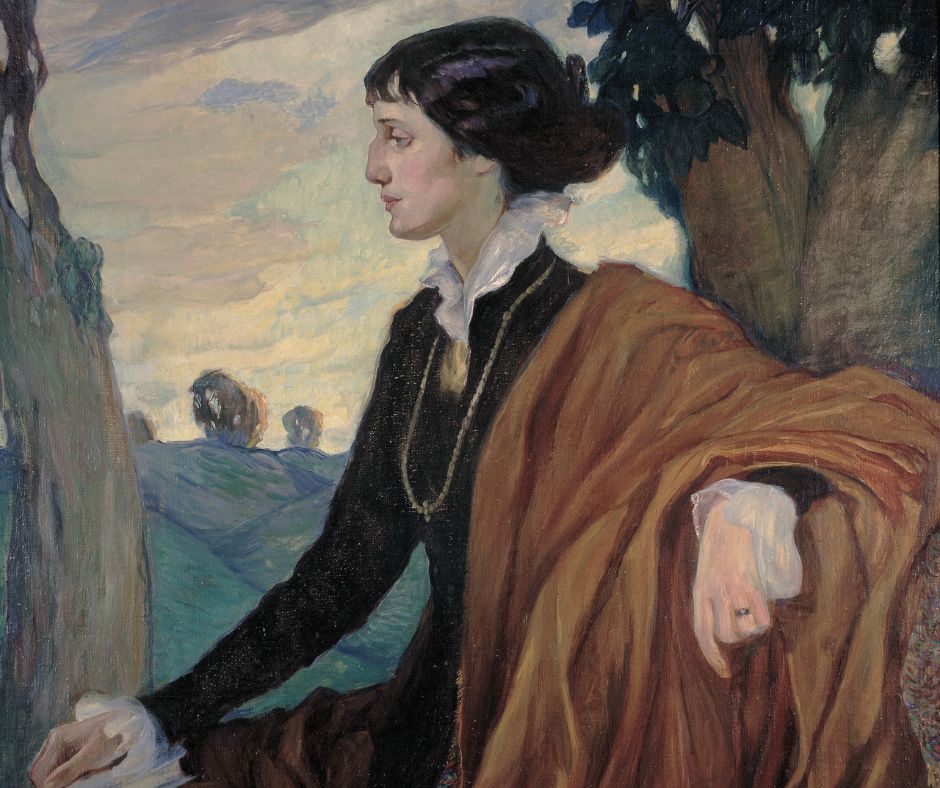

The Terrible Life and Strange, Striking Poetry of Anna Akhmatova
Summary
This article delves into the life and poetry of Anna Akhmatova, a prominent 20th-century Russian poet known for her striking work amidst personal and political turmoil. Akhmatova’s poetry, reflecting themes of love, loss, and resilience against oppression, offers a powerful testament to the human spirit’s endurance.
Reflection Questions
- How does Akhmatova’s ability to transform personal and societal suffering into art inspire your own ways of dealing with adversity?
- What can Akhmatova’s dedication to her craft despite political persecution teach us about the role of art in society?
- How does the theme of resilience in Akhmatova’s work resonate with challenges you face today?
Journal Prompt
Reflect on a moment of hardship in your life and consider how you could use that experience as a source of strength or inspiration, similar to how Anna Akhmatova used her poetry as a means to navigate and respond to her life’s challenges.
Respected as one of the foremost and most famous poets of 20th-century Russian literature, Anna Akhmatova navigated a tumultuous era marked by personal hardships and political turmoil. Born Anna Andreevna Gorenko in 1889, she adopted the pen name Akhmatova. Akhmatova herself noted that the choice of the pseudonym was partly due to the exotic sound of the name and a distant Tatar prince in her family lineage, rather than a direct, immediate Tatar ancestry. Throughout her life, Akhmatova wrote poetry that served as a powerful reflection of the human condition—capturing the essence of love, loss, and the enduring resilience of the human spirit. Despite facing personal tragedies, including the loss of loved ones and enduring political persecution under the Stalinist regime, Akhmatova’s poetry output remained unwavering, serving as a beacon of hope and artistic brilliance in the face of adversity. Let’s explore the profound significance of her poetry as a testament to resilience and artistic prowess amidst the trials of her time.
The Beginning of Anna Akhmatova’s Story
Anna Akhmatova was born Anna Andreevna Gorenko on June 23, 1889 in Bolshoy Fontan—a suburb of Odessa, Ukraine. She hailed from a well-educated and cultured family. Her father—Andrey Antonovich Gorenko—was a naval engineer, and her mother—Inna Erazmovna Stogova—was a talented amateur pianist. Akhmatova’s upbringing was steeped in literature and the arts—fostering her early interest in poetry and storytelling.
Her Early Exploration of Russian History and European Literature
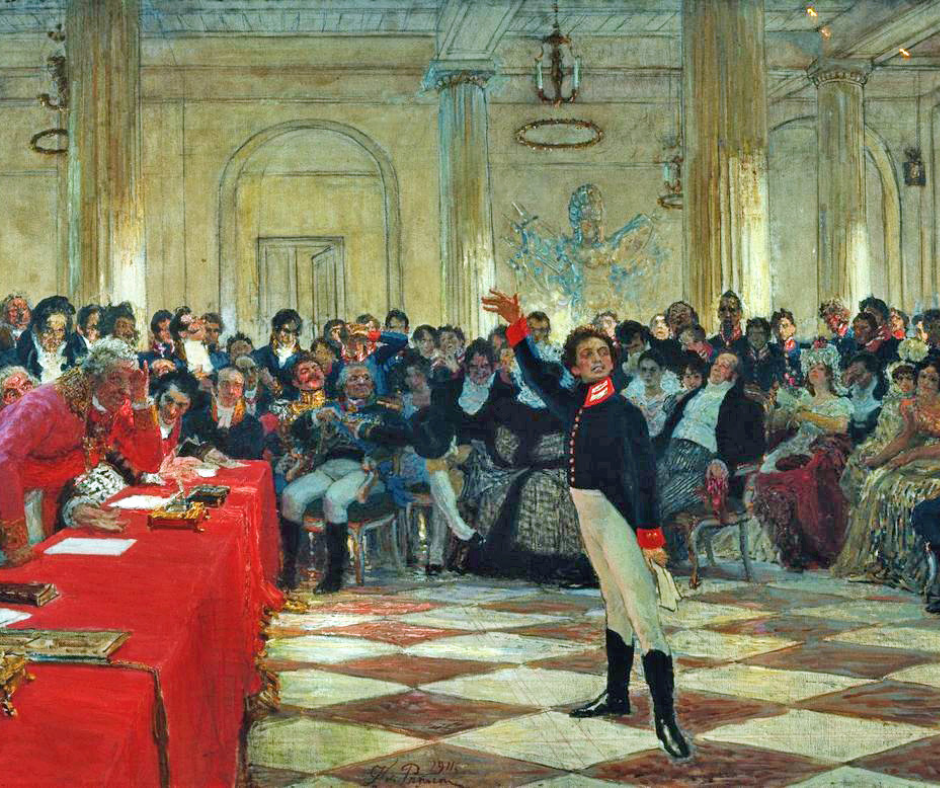

A painting of Alexander Pushkin reciting a poem before Gavrila Derzhavin in the Tsarskoye Selo Lyceum on 8 January 1815, by Ilya Repin, 1911
Akhmatova’s literary journey was heavily influenced by her early exposure to the works of Russian and European writers. She received a comprehensive education—studying literature, history, and languages at the Bestuzhev Courses for Women in St. Petersburg. Here, she developed a deep appreciation for the classics of Russian literature—including the works of Alexander Pushkin, Fyodor Dostoevsky, and Leo Tolstoy. These literary giants would leave an indelible mark on Akhmatova’s poetic style and thematic concerns.
Themes in Her First Poems
In her formative years when Akhmatova began writing, the young poet experimented with various styles and themes—gradually developing her unique voice and perspective. Influenced by the Symbolist movement and the Silver Age of Russian poetry, her early works often explored themes of love, nature, and spiritual longing—infused with rich symbolism and vivid imagery.
Her debut collection—”Evening” (1912)—marked the emergence of her distinctive poetic style—characterized by its lyrical elegance and introspective depth. Through her exploration of themes such as love, mortality, and the fleeting nature of existence, Akhmatova laid the groundwork for her future masterpieces—establishing herself as a prominent voice in Russian poetry.
The Turmoil of Revolution and War
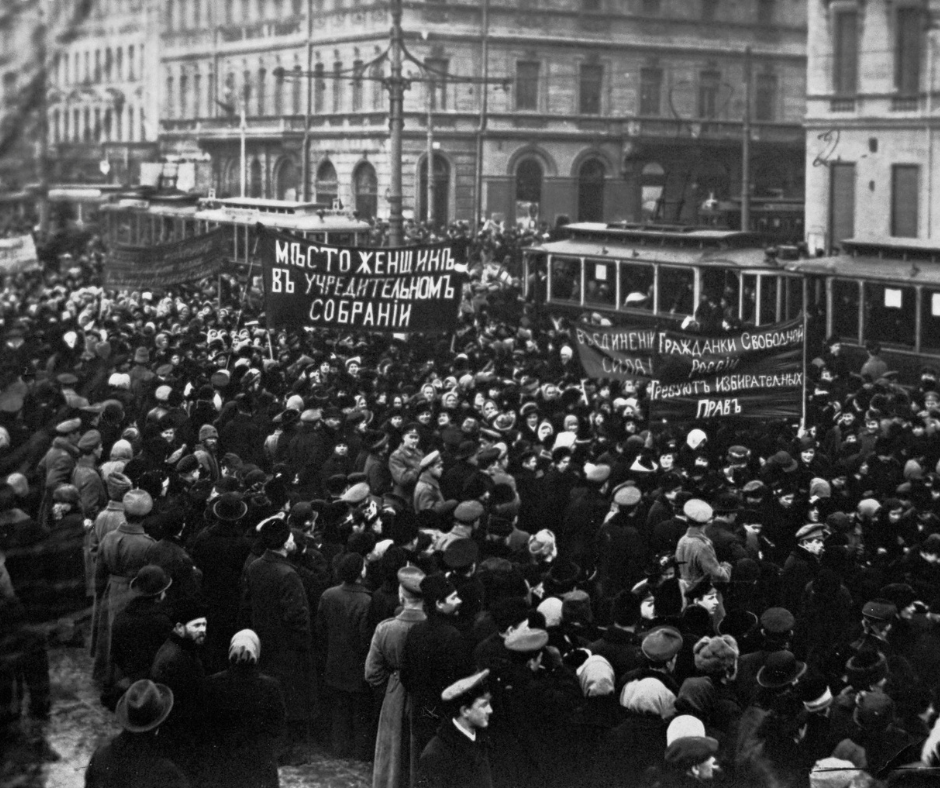

Protesters holding banners at Nevsky Prospect.
The Russian Revolution of 1917 brought about significant upheaval in Anna Akhmatova’s life and work. As a prominent literary figure deeply rooted in the cultural and intellectual circles of St. Petersburg, she witnessed firsthand the seismic shifts in Russian society following the overthrow of the Tsarist regime. The revolutionary fervor and subsequent establishment of Soviet power ushered in a period of uncertainty and repression, profoundly impacting Akhmatova’s creative output and personal circumstances.
Akhmatova’s Poetry During the Stalinist Era
Akhmatova’s poetry during the Stalinist era serves as a haunting reflection of the suffering and despair inflicted upon the Russian people. Among her most poignant works from this period is “Requiem”—a monumental composition that bears witness to the human toll of Stalinist terror. Written in response to the imprisonment and execution of her loved ones—including Akhmatova’s son Lev Gumilev and several of Akhmatova’s friends—”Requiem” embodies Akhmatova’s defiance in the face of totalitarian oppression—capturing the collective anguish and resilience of the Soviet populace.
The outbreak of World War II and the subsequent Siege of Leningrad brought further hardship and trauma to Akhmatova and her fellow citizens. As the Nazi army besieged the city—cutting off vital supply routes and subjecting its inhabitants to starvation and bombardment, Akhmatova endured unimaginable suffering and loss. Despite the dire circumstances, she continued to write poetry. Her poems began to bear witness to the horrors of war and paying tribute to the resilience of the human spirit. Through works such as “Poem Without a Hero” and “The Muse,” Akhmatova confronted the existential challenges of wartime existence, offering solace and solidarity to her beleaguered compatriots.
Anna Akhmatova’s Personal Tragedies and Persecution
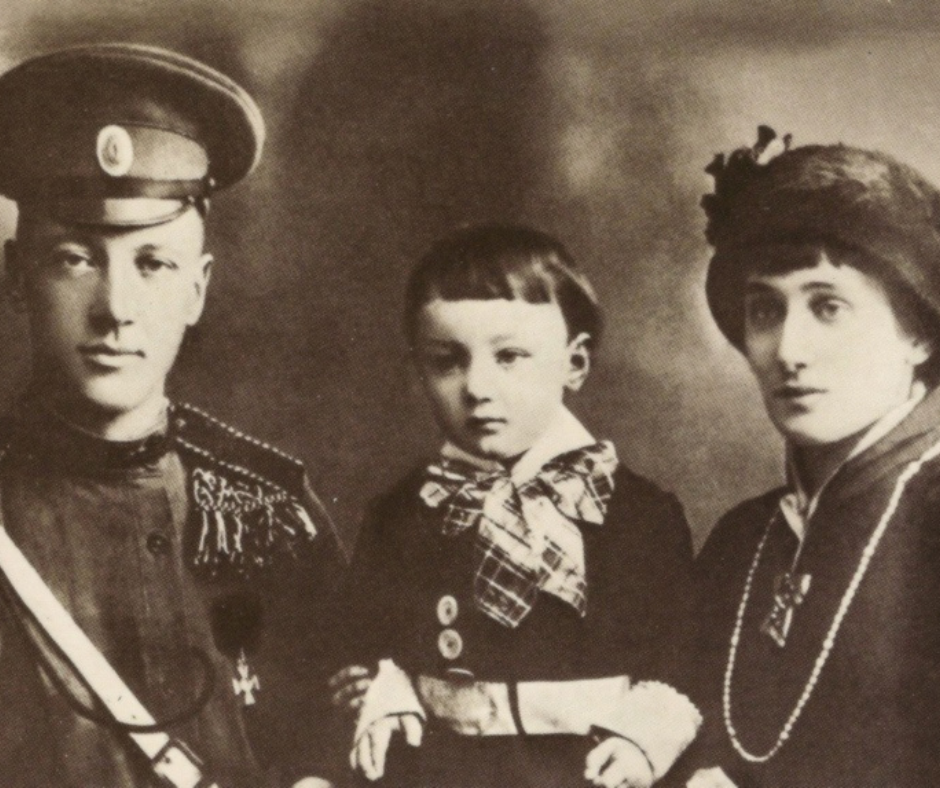

The poet’s life was marked by significant relationships and marriages. She married Nikolay Gumilev—a prominent poet—in 1910, and the couple had a son named Lev. However, their marriage ended in divorce in 1918. Akhmatova later married prominent art scholar and fellow poet Vladimir Shileiko in 1918, but this marriage also ended in divorce in 1928. Akhmatova’s third husband Nikolai Punin was imprisoned and eventually passed while held at a Siberian prison camp. Her relationships and marriages influenced her poetry and personal experiences—shaping the themes and emotions reflected in her works.
Akhmatova’s poetry delves deeply into personal anguish and societal upheaval, often drawing from her own life and observations. Poems like “Lot’s Wife” and “Poem Without a Hero” reflect the profound sense of loss and disillusionment that permeated Akhmatova’s life during times of political upheaval and personal tragedy. “Lot’s Wife” explores themes of regret and transformation, while “Poem Without a Hero” delves into the complexities of memory and identity. Through these poems, Akhmatova grapples with the existential challenges of her time—offering poignant reflections on the human condition.
Response to Persecution Under Stalin
Anna Akhmatova faced persecution under Stalinist rule—enduring censorship and suppression of her works. Her poetry—characterized by its boldness and defiance—drew the ire of Soviet authorities, who viewed her writing as subversive and anti-Soviet. Soviet authorities referred to her as “half nun, half harlot” and imprisoned her son for seven years. Despite his imprisonment and persecution, Lev Gumilev went on to become a prominent historian and ethnographer.
Though she tried to join the ranks of other Soviet writers in praising Stalin’s rule so her son would be released, it was not until Stalin died that Lev was let go. Akhmatova’s works were banned from publication, and she faced constant surveillance and harassment from the state. Despite the risks, she continued to write poetry in secret—preserving her artistic integrity in the face of relentless persecution. Akhmatova’s resilience and courage in the face of political repression serve as a testament to her unwavering commitment to artistic freedom and human dignity.
Akhmatova’s Retreat and Later Years
While she was not officially exiled from the Soviet Union, she endured periods of self-imposed exile and internal exile within the Soviet Union, which greatly impacted her personal and professional life. She spent time in Tashkent, Uzbekistan during World War II, where she worked as a nurse and witnessed the devastation of the Siege of Leningrad from afar. Additionally, she experienced social and cultural isolation within Soviet society due to censorship and persecution, which effectively restricted her movements and limited her access to publishing opportunities.
During World War II, Akhmatova evacuated to Tashkent, which was a common refuge for many intellectuals and artists at the time. This was not a political exile, but rather part of a broader movement of people during the war. Her later “internal exile” and social ostracism during the Stalinist period, leading to limited publishing opportunities and social isolation, are crucial contexts that underline her struggles and resilience.
Following her son Lev Gumilev’s arrest in 1938, Akhmatova faced increased persecution from Soviet authorities. She was expelled from the Union of Soviet Writers in 1946 and endured years of surveillance and harassment. Akhmatova’s poetry was also subjected to censorship, with many of her works remaining unpublished during her lifetime. Despite these challenges, she continued to write in secret—maintaining her commitment to artistic expression even in the face of adversity.
Themes in Her Late Poetry
In her later years, Anna Akhmatova’s poetry took on themes of reflection and mortality, reflecting her own experiences and the passage of time. Poems such as “The Muse” and “In the Evening” showcase Akhmatova’s contemplative voice and lyrical mastery. “The Muse” explores the transformative power of art and the enduring inspiration of creativity, while “In the Evening” reflects on the inevitability of death and the transient nature of existence. Through these works, Akhmatova grapples with the complexities of life and the mysteries of the human soul—offering poignant meditations on the human condition.
Fuel your creative fire & be a part of a supportive community that values how you love to live.
subscribe to our newsletter
*please check your Spam folder for the latest DesignDash Magazine issue immediately after subscription


Recognition of Her Work in Russia and Abroad
Anna Akhmatova received several awards and recognition later in her life, acknowledging her significant contributions to Russian literature. In 1940, she was awarded the Stalin Prize for her poetry collection “From Six Books” (1936-1940). Despite the political complexities surrounding the prize, it served as official recognition of her literary achievements.
In 1964, Akhmatova was nominated for the Nobel Prize in Literature, which further solidified her status as one of the most esteemed poets of her time. Although she did not win the Nobel Prize, the nomination itself was a testament to the international acclaim and respect she garnered as a poet.
Additionally, Anna Akhmatova received the Etna-Taormina Prize in 1964, an Italian literary award recognizing her outstanding contributions to poetry. This award further underscored her significance not only in Russian literature but also on the global literary stage. A year later, Oxford University granted her an honorary doctorate. Just one year after that award, Akhmatova passed away in St. Petersburg.
Despite facing censorship and persecution during her lifetime, Anna Akhmatova’s literary legacy was ultimately recognized and celebrated both within Russia and abroad—solidifying her status as one of the most influential poets of the 20th century.
Selected Poems by Anna Akhmatova
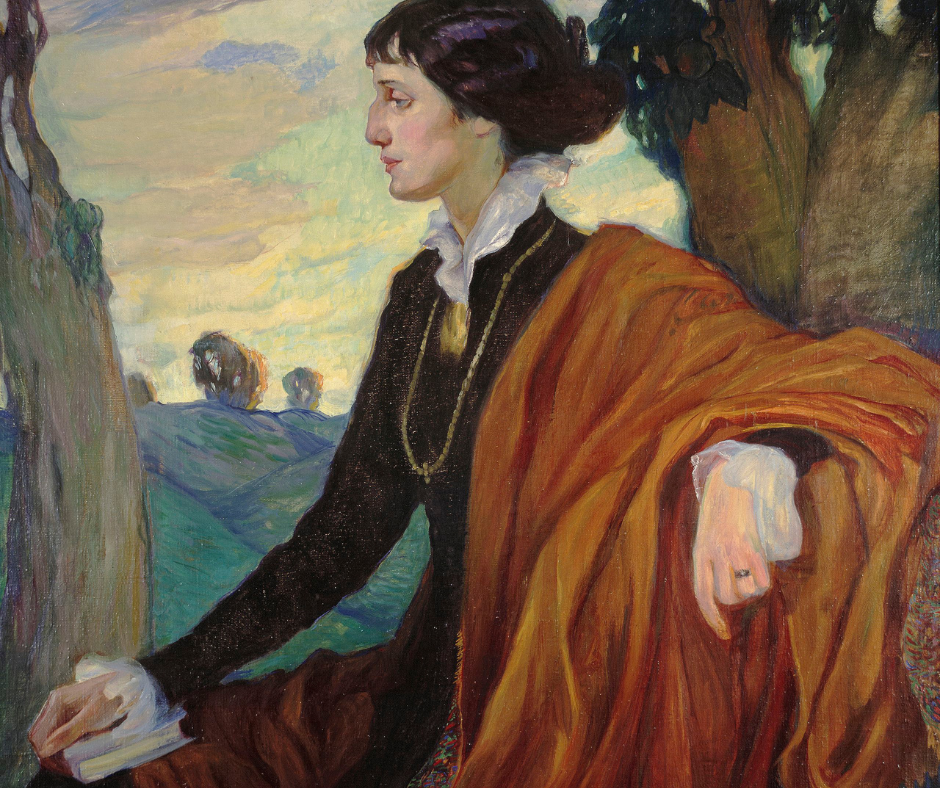

The pieces listed and analyzed below provide insight into the themes, imagery, and emotional resonance of the poems of Anna Akhmatova, highlighting the enduring significance of her work in the Russian literary scene and beyond. To read more of her poetry, we encourage you to purchase or borrow The Complete Poems of Anna Akhmatova—either the original text or the version translated into your language.
“Requiem”
A poignant and deeply personal response to the atrocities of Stalinist oppression, “Requiem” serves as a memorial to the victims of political persecution in the Soviet Union. Composed over several decades, the poem captures Akhmatova’s anguish as she reflects on the suffering endured by her fellow citizens, including her own experiences of loss and fear. Through its fragmented structure and evocative imagery, “Requiem” embodies the resilience of the human spirit in the face of tyranny.
“Lot’s Wife”
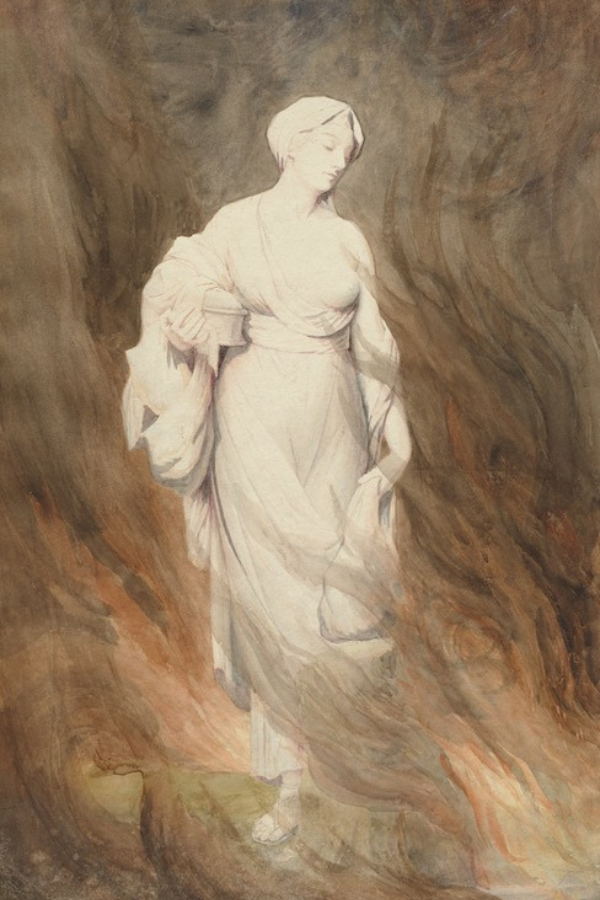

Lot’s Wife, Alfred George Stevens (English, 1817-1875)
Drawing on the biblical narrative, Akhmatova’s “Lot’s Wife” explores themes of longing, regret, and the consequences of looking back. The poem’s titular figure becomes a symbol of human frailty and the struggle to reconcile past actions with present circumstances. Through its haunting imagery and metaphorical depth, “Lot’s Wife” invites readers to reflect on the complexities of choice and the inexorable passage of time.
“Reed”
In “Reed,” Akhmatova employs the imagery of a reed bending in the wind as a metaphor for human resilience and endurance. The poem celebrates the strength of the human spirit in the face of adversity, emphasizing the capacity for hope and renewal even in the midst of hardship. Through its lyrical language and emotive imagery, “Reed” invites readers to contemplate the power of perseverance and the beauty of resilience.
“White Flock”
Akhmatova’s “White Flock” is a collection of poems characterized by themes of love, loss, and longing. Through its exploration of human relationships and the passage of time, the collection offers a lyrical meditation on the complexities of the heart. Drawing on imagery from nature and everyday life, “White Flock” evokes a sense of melancholy and nostalgia, inviting readers to reflect on the fleeting nature of love and memory.
“The Muse”
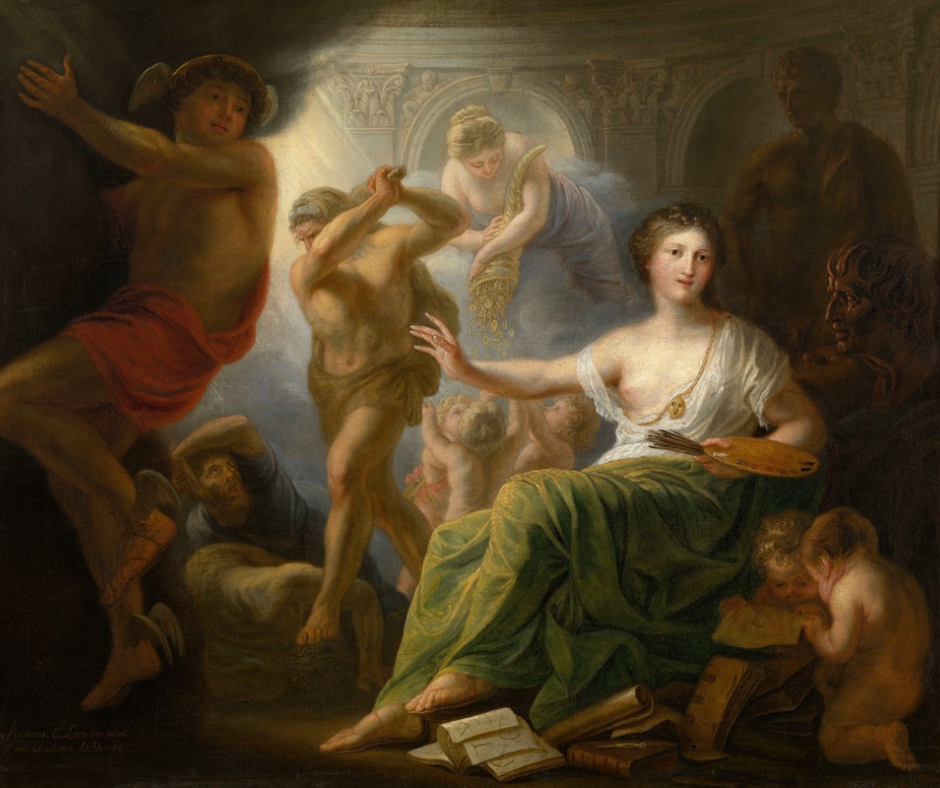

Hercules Protects the Muse of the Arts against Envy and Ignorance (1763), Andries Cornelis Lens (Flemish, 1739 – 1822)
In “The Muse,” Akhmatova reflects on the nature of inspiration and the role of the artist in the creative process. Through its exploration of the relationship between the poet and their muse, the poem offers a meditation on the mysteries of creativity and the pursuit of truth and beauty. With its introspective tone and philosophical depth, “The Muse” invites readers to contemplate the transcendent power of art and its enduring influence on the human soul.
“In the Evening”
“In the Evening” is a reflective poem that contemplates the passage of time and the inevitability of death. Through its imagery of twilight and fading light, the poem evokes a sense of melancholy and resignation, inviting readers to confront the transient nature of life. Despite its somber tone, “In the Evening” also celebrates the beauty of existence, urging readers to find solace in the eternal rhythms of the natural world.
“You Will Hear Thunder”
Akhmatova’s “You Will Hear Thunder” is a defiant response to the pain of betrayal and heartbreak. Through its vivid imagery and impassioned language, the poem conveys a sense of defiance and resilience in the face of adversity. With its themes of love and loss, “You Will Hear Thunder” speaks to the universal experience of human suffering and the enduring power of the human spirit.
“The Sentence”
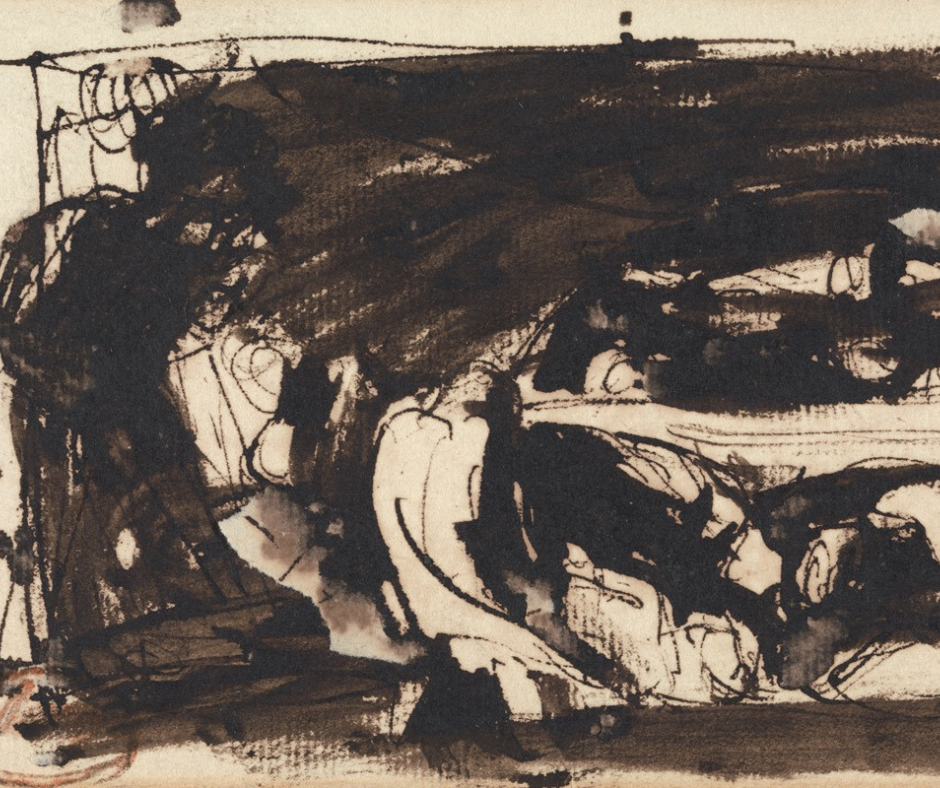

Prison Scene, George Romney (English, 1734-1802)
“The Sentence” is a haunting reflection on the experience of imprisonment and political persecution. Through its stark imagery and spare language, the poem captures the despair and resignation of those condemned by totalitarian regimes. With its chilling portrayal of oppression, “The Sentence” serves as a powerful reminder of the human cost of tyranny and injustice.
“Song of the Last Meeting”
In “Song of the Last Meeting,” Akhmatova explores themes of separation and longing with lyrical grace. Through its evocative imagery and emotive language, the poem conveys a sense of melancholy and nostalgia, inviting readers to reflect on the transient nature of love. Despite its themes of loss, “Song of the Last Meeting” also celebrates the enduring power of human connection, urging readers to cherish the memories of past encounters.
“I Taught Myself to Live Simply”
Akhmatova’s “I Taught Myself to Live Simply” is a meditative poem that extols the virtues of simplicity and humility. Through its imagery of nature and everyday life, the poem celebrates the beauty of small moments and the joy of living in harmony with the world. With its gentle tone and lyrical language, “I Taught Myself to Live Simply” invites readers to embrace the simple pleasures of existence and find contentment in the present moment.
Anna Akhmatova’s Legacy in Russian Literature and Beyond
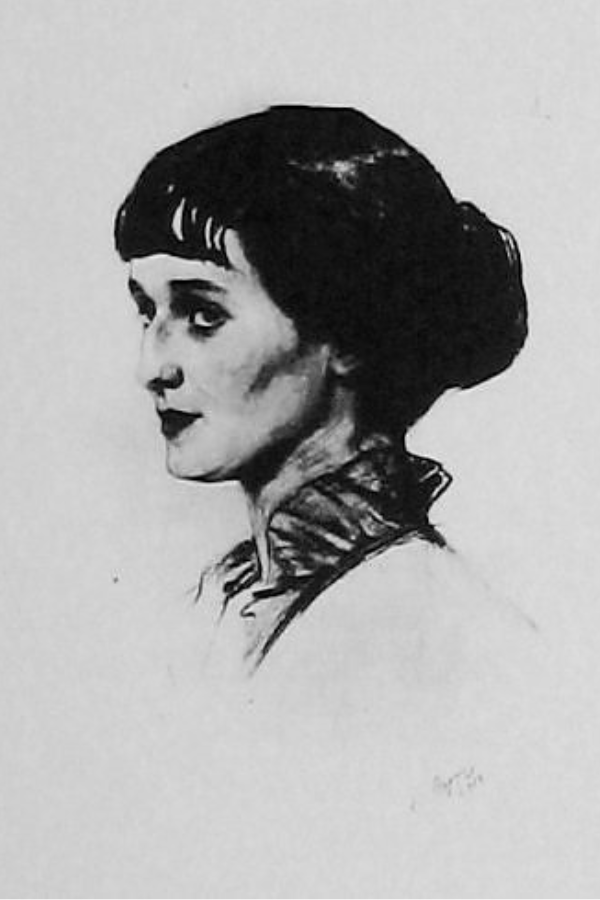

Anna Akhmatova’s legacy as one of the preeminent poets of 20th-century Russian literature is widely recognized and celebrated. Despite facing persecution and censorship, her poetry remains a testament to the enduring power of artistic expression in the face of oppression. Akhmatova’s profound insights into the human experience, her lyrical elegance, and her unwavering commitment to truth and beauty have cemented her place in the pantheon of Russian literary giants. Her works continue to inspire readers around the world—serving as a timeless reminder of the resilience of the human spirit and the transformative power of art.
Design Dash
Join us in designing a life you love.
-
Get to Know the DesignDash Team Through a Q&A at Our 2024 Holiday Party!
From favorite traditions to proudest moments, get to know the team and what inspires them for the new year by reading our 2024 holiday Q&A!
-
Your Digital Footprint: Why Entrepreneurs Need to Think Beyond Social Media
Social media is great for today, but creative entrepreneurs need a lasting online presence. Learn how to expand your digital footprint with websites, newsletters, and features that showcase your work for years to come.
-
Winter Capsule Wardrobe: Staying Stylish This Season with Just 10 Pieces
Simplify your mornings and elevate your style with our guide to creating a winter capsule wardrobe!
-
10 Simple Winter Wellness Habits to Boost Your Mood All Season
These 10 simple winter wellness habits will help you stay energized, nurture your health, and bring moments of joy to the colder months.
-
The Time-Turner Effect: How to Juggle Multiple Projects Without Losing Your Sanity
Is it possible to juggle multiple projects without burning out? Yes! Learn how to prioritize tasks, manage your time, and stay organized.
-
How to Parent as an Introvert and Recharge When You’re Always ‘On’
We promise, introverted parents can balance family life, social demands, and creative careers while protecting their energy. Here’s how.








